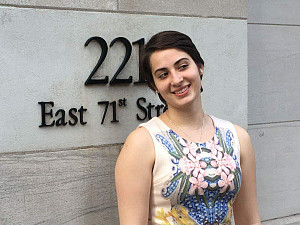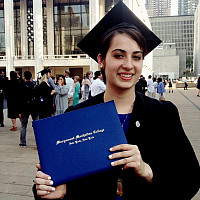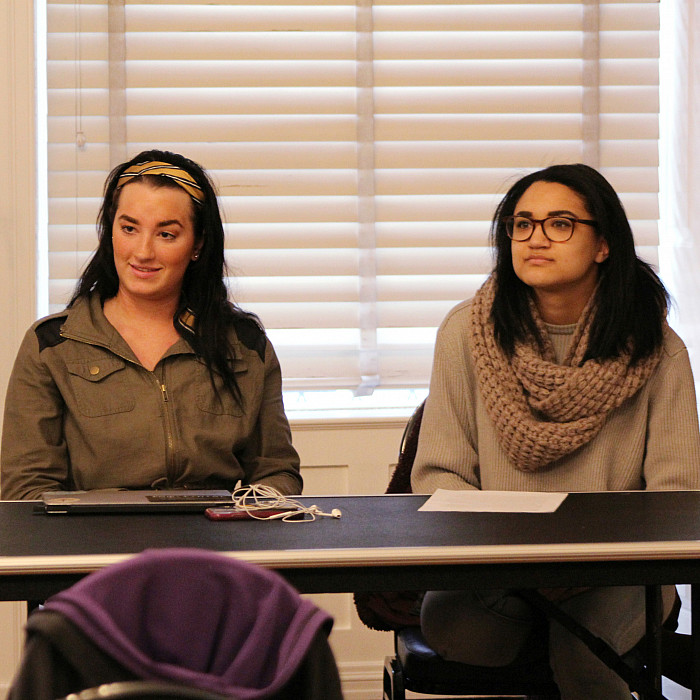Master of Divinity: Catching Up with Kiah Baxter ’16

Dr. Bradley Herling, Chair of the Division of Humanities and Social Sciences - who also oversees Religious Studies at MMC- had the opportunity to chat with Kiah over email, getting a in-depth and candid look at post-MMC life.
Dr. Brad Herling: Let’s start with what degree are you pursuing?
Kiah Baxter: I am currently in the third and final year of the Masters of Divinity program at Union Theological Seminary. I am [in the] ordination track within the program, meaning that I am pursuing ordination through my denomination and taking courses to fill the denomination’s requirements for pastoral ministry as well as the courses required for my concentration which is Theology and the Arts.
BH: And what led to you to graduate studies at Union?
KB: I decided that graduate studies were the next step for me in the middle of my junior year at Marymount. I had just gotten back from working at one of my denomination’s summer camps and loved to experience. It felt like the kind of work that I wanted to do as a vocation. I started doing research into the kind of degree I might need in order to do ministry as a career. I found that a master’s degree was a common next step. I was also guided by my course work that semester. I had filled many of my required courses and was taking classes in my major fields of interest: religion, art, and history. I realized through these classes my level of passion and interest in these classes over others that I had taken that I wanted to be able to explore the intersection between religion and art at a deeper level while moving towards working as a pastor. This affirmed for me that getting a master’s degree of some sort would be the best way to continue to explore and develop these interests as a path for career development.
I chose Union because of the quality and diversity of their degree programs as well the befit of being able to stay connected to the wonderful community that I had fostered during my time at Marymount. Union’s focus on social justice combined with a variety of concentrations and the advantages of being at an institution that is ecumenical instead of set in a singular Christian tradition creating space for constant dialogue about the assumptions that I bring into my faith and able to dive deeper into the theological underpinnings of these beliefs.
BH: What class or professor at Union has been most influential or significant for you?
KB: There are a few courses and professors that have stood out to me over the past few years. The first is ST 103 (foundations in Christian theology) with Professor James Cone. It was my first class on my first day of seminary and there really was nothing like hearing Professor Cone lecture. Cone’s passion for his students and theology created an exciting learning environment. Cone also constantly encouraged us to “find our voices” which in the midst of sorting through the ideas of 3 or 4 theologians each week and reading hundreds of pages help keep the reason for doing the reading and papers in perspective. There was also something in taking a class with Professor Cone in the experience in being in class with such an important theological presence. I had read some of Cone’s work in undergrad so I knew how important his writing was to liberation theology and to actually get to learn from Cone himself was an amazing experience.
The others have been the courses I have taken with Professors Lisa Thompson and Claudio Carvalhaes. Thompson and Carvalhaes teach preaching and worship here at Union. These are most significant because they feel like the classes that I have found what I am most interested in and passionate about the subject and how the content relates to the ministry that I see myself doing in the future. The process of learning about liturgy and ritual changed the way that I think about worship spaces and services. The classes also tend to be focused more on practice. We get to try out the rituals, liturgies, and sermons we have written and critiquing each other work so that it can become stronger.
BH: How has Prof. Cone’s liberation theology and commitment to social justice affect your own choices about career and life vocation?
KB: For me Cone’s liberation theology and commitment to social justice opened my eyes to the ways that theology is written created and done. Cone spoke so passionately about how he wrote his theology out of necessity. He wrote Black liberation theology because there needed to be a theology that responded to the experiences of Black folks in the US in a way that previous theologians did not. As much as I had been taught to read and write critically Cone took this to the next level and I feel like empowered me and all his students to not just read and accept the theologies of tradition. That if the theology is not responding to our experiences to write our own and be critical and think about the contexts from which we are coming from and who we are accountable too. I think I have learned to become more critical of theologies and beliefs that I encounter each day and look at how they are helping or hurting the communities that I am accountable to.
BH: So what do you anticipate doing after graduate school? And/or: What’s your dream job?
KB: I have a few different plans for after I graduate. Most importantly I am hoping to be employed. I am looking at church jobs in children, youth and young adult ministry. It will take me at least a year to finish the ordination process, so I am looking for jobs in which I can be doing church work and not have to be ordained. I am also interested in doing campus ministry work as have loved working in higher education when I have had the opportunity and would love to connect Higher Ed and ministry work.

To learn more about Union Theological Seminary’s programs, click here.
Published: February 13, 2019
